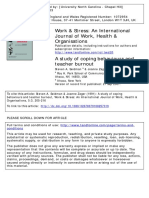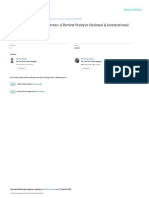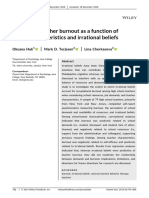0% found this document useful (0 votes)
14 views2 pagesAbstract
This systematic review aims to investigate the relationship between occupational stressors experienced by teachers and professional burnout. It will review existing literature on occupational stress and burnout in teaching published up to December 2022, using the PRISMA guidelines. The review will identify coping strategies supported by research to help teachers manage stress and prevent burnout. The results could enhance understanding of stressors teachers face and how they relate to burnout. They may also inform interventions and professional development programs to promote teacher wellbeing.
Uploaded by
29s979v7kgCopyright
© © All Rights Reserved
We take content rights seriously. If you suspect this is your content, claim it here.
Available Formats
Download as DOCX, PDF, TXT or read online on Scribd
0% found this document useful (0 votes)
14 views2 pagesAbstract
This systematic review aims to investigate the relationship between occupational stressors experienced by teachers and professional burnout. It will review existing literature on occupational stress and burnout in teaching published up to December 2022, using the PRISMA guidelines. The review will identify coping strategies supported by research to help teachers manage stress and prevent burnout. The results could enhance understanding of stressors teachers face and how they relate to burnout. They may also inform interventions and professional development programs to promote teacher wellbeing.
Uploaded by
29s979v7kgCopyright
© © All Rights Reserved
We take content rights seriously. If you suspect this is your content, claim it here.
Available Formats
Download as DOCX, PDF, TXT or read online on Scribd
/ 2


























































